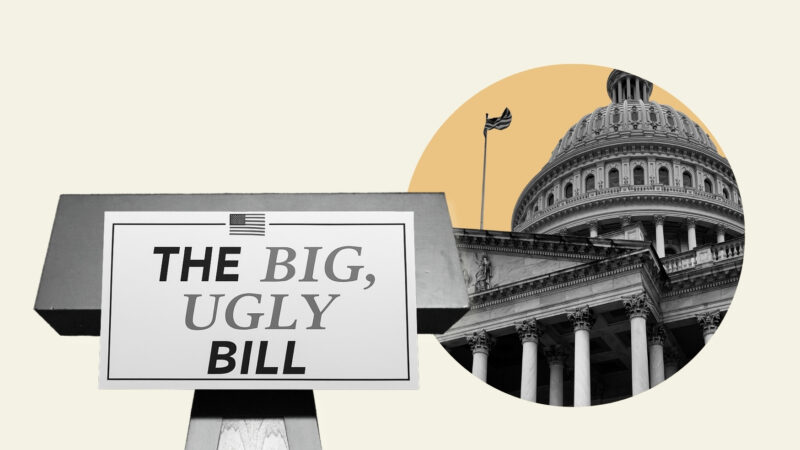Tax Fight 2025
Top Five Ways That H.R. 1 Hurts the American People
From tax hikes for working families to handouts for the wealthy, the bill spells disaster for working- and middle-class Americans

1. Gives tax breaks to the ultra-rich while raising prices and cutting essentials for working- and middle-class people.
- It raises costs on working-class families and gives a massive tax cut to the rich.
- People who make $96K a year or less will end up paying more on their taxes on average, while multi-millionaires get a massive tax cut.
- It makes health insurance more expensive.
- Raises average annual premiums by at least $700 or more for the 20M+ people who get health coverage through the Affordable Care Act. 4.2 million Americans will be priced out of the insurance marketplace altogether.
- It forces rural hospitals to close or cut services.
- Across the country, over 300 rural hospitals are at immediate risk of shutting their doors or eliminating life-saving services due to healthcare cuts in the bill.
- It increases energy bills.
- Repeals nearly all clean energy tax credits, raising household electricity prices by up to $415 a year by 2035.
- It makes college more expensive.
- Limits eligibility for Pell grants. 4.4M students could be required to pay an extra $7,400 for a bachelor’s degree or $3,700 for an associate degree.
- It raises the cost of student loans.
- The average student loan borrower will see their payments rise by $244 per month.
- It creates costly penalties for losing your job or working irregular hours.
- Requires most people to report hours worked to access Medicaid and SNAP. This policy will kick off people who unexpectedly lose their job or who work inconsistent hours week-to-week, like most care and service workers.
2. Prices millions of Americans out of healthcare and food security by gutting Medicaid, Medicare, and SNAP
- The bill proposes over $1.5 TRILLION in cuts to Medicaid, Medicare, and food security.
- The bill makes the biggest cuts to Medicaid, the Affordable Care Act, and Medicare in history, and will cause over 15 million people to lose their health insurance by 2034.
- The bill cuts about $1 trillion from Medicaid alone. It adds trillions to the deficit, thus forcing about $500 billion in automatic cuts to Medicare starting in 2026.
- The bill also cuts $186 billion from SNAP, and could terminate or substantially cut benefits for 4 million people who currently need help to feed their families.
3. Removes kids from the Child Tax Credit, driving millions of families into poverty or economic instability
- The Child Tax Credit proposal could push up to 2 million kids into, or deeper into, poverty.
- It would kick off 2.6 million American kids in mixed-status families who are currently eligible for the credit simply because their parents are immigrants. These are children with Social Security Numbers who are US citizens or legal permanent residents.
- It would do nothing for the 17 million lowest-income kids locked out of the full credit because their parents’ income is too low, and in fact, it would increase that number to 19 million kids left out.
4. Adds trillions to the deficit to fund tax breaks for the ultra-rich and ICE’s deportation machine
- The bill adds over $3.4 trillion to the deficit to pay for tax cuts to the ultra-rich and unprecedented funding for ICE.
- The average multi-millionaire will get a six-figure tax windfall next year from this bill, while nearly half of American households won’t even get $100 in tax cuts. The richest 1 percent (people with incomes above about $1 million) benefit more than the bottom 80 percent combined.
- The bill gives ICE around $75 billion in new funding – almost tripling their budget – to increase detentions and deportations. This is enough money to fund the detention of 116,000 people per day.
- It also gives the Department of Homeland Security $46.6 billion in funding for construction of a border wall, and another $10 billion for vague “reimbursement costs” that experts worry could be used as a slush fund.
5. Pushes the American Dream out of reach for many future students, leaving us with fewer doctors, dentists, social workers, and other professionals.
- The bill makes federal student loans more expensive, more exclusive, and harder to pay back – especially for graduate students.
- It caps lifetime student loan amounts at $100K for graduate students and $200K for professional students. These are far lower amounts than the total cost of attending medical school or law school, forcing students to turn to high-interest private loans or give up on their dreams.
- It eliminates the Grad PLUS loan program entirely. This loan program is currently used by about half of all US students who are in med school.
- It stops all undergrad and graduate students who take out loans after July 1, 2027 from deferring repayments due to unemployment or economic hardship, squeezing cash out of borrowers least able to pay.